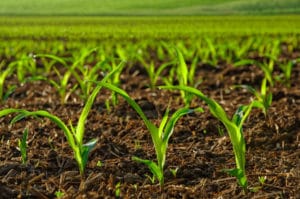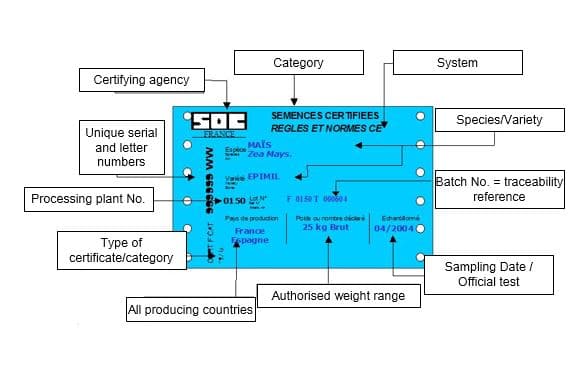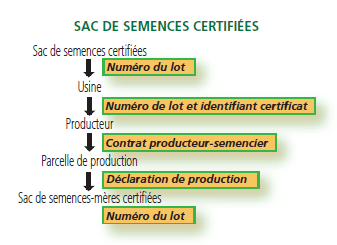
High Added-value Seeds
French-produced maize seeds have a rich genetic background and high added-value. Varietal purity and germination quality secure optimum crop establishments. The resulting high yield potential is further strengthened by seed treatments, which ensure the seeds’ protection against the damage caused by vermin (fungi, insects, birds). This is the technological “package” that is available to the grower when they decide what seeds to grow.
Optimum Germination

The germination ability of French-produced seeds is very high. Most of the French seed production is believed to stand well above the 90 percent required by the certification system. This positive difference is a perfect illustration of the French industry’s commitment to deliver seeds of impeccable quality.
However, the germination ability as measured in the controlled environment of a laboratory is not an exact predictor of actual field emergence. Air and soil temperature, soil compaction and soil moisture content, as well as planting depth and quality are all factors that affect actual emergence rate.
To simulate the specific field conditions, experts have developed vigour tests meant to detect high-risk sites under poor emergence conditions. Vigour is viewed as the crop’s ability to emerge correctly and to produce viable, homogeneous seedlings even in unfavourable conditions. The tests are based on three varying parameters: temperature (from 8 to 10°C), the amount of water in the culture medium (from 10 percent to saturation), and the type of medium used (soil, sand, compost). Once the tests are completed, the seed lots whose germination rate is not high enough are withdrawn from the market.
All Grades Are Good
The various tests that have been carried out to-date indicate that grain grading has no proven impact upon yield. Maize grain grades are determined by the genetic traits of the basic seeds used for multiplication purposes, as well as by the growing conditions. The same hybrid grown in two different production regions may present different grades. Physiologically speaking, the growth rate (the speed at which leaves emerge) is considered to be identical, no matter the grade.
That growth stage homogeneity within the same plot is what actually maintains the potential of each plant.
Unquestionable Varietal Purity
Varietal purity can be safely described as a hallmark of varieties “made in France”. As such, it depends on the quality of basic seeds used, as well as on careful supervision, carried out by all actors throughout the production cycle. The “flawless” requirement regarding varietal purity means that the grower who multiplies the seeds must thin out the maize plants during the crop’s development, and also perform perfect detasseling.
Statistics indicate that through the growers’ careful monitoring and competence, purity levels are kept well over the level required by the regulatory framework on certification. The French industry strives to maintain that high standard year after year, in order to ensure that the grower gets the quality and yield potential they expect, when buying a bag of certified seeds.
However, given the number of manipulations that a seed lot undergoes during processing, the seeds will be likely to contain two types of impurities:
– typical impurities (foreign matter such as grains of other species, broken grains, pebbles)
– hybrid-specific impurities: grains issued either from crosses with pollen coming from outside the field (aberrant grains), or from pollination of female parent lines where detasseling has not been done properly (self-pollination).
Nevertheless, this type of impurities remains limited, thanks to the strict standards of the French certification system.
Traceability of Each Seed Bag Back to the Multiplication Plots
A certificate as an identity card
In France, every bag of certified seeds has related records regarding its history, which are accessible primarily via a lot number.
Thus, the seed certificate includes:
- The registration number of the plant that has carried out the seed conditioning;
- The registration number of the company that has submitted the seed lot for certification;
- A letter indicating the production season that the certified seed is associated with;
- A processing number assigned inside the plant.
Through this serial number, the French traceability system allows one to find out where, when and who has produced and certified each bag of seeds. The traceability system also provides direct access to the results of the tests that were carried out prior to the certification.
Besides the bag-to-plant traceability, the French system allows one to trace the plant back to the multiplication plot where the seeds were produced. Every plot that produces certified seed is subject to a contract between the producer and the seed company.
The contract, or the so-called “crop production statement” will list all the data regarding the crop: the species, the variety, the area, the seed category to be produced, the lot number, and the category of parent seeds delivered to the producer.
A Quality Control Tool
That traceability system – which allows one to link the commercial bag back to the producer’s plots – is a highly-reliable tool, to the seed companies.
Through the historical data it provides regarding the crops and the seed lots, the system allows one to look into the causes of a poor production. This in turn enables one to take the necessary corrective measures, thus contributing to the excellent quality of the French-produced seeds.
Guaranteed Quality for Downstream Sectors
The maize industry brings added value to all sectors using maize, such as the high-quality livestock sectors. Thus, traceable seeds represent the first link in a value chain where traceability is a must, nowadays.
The same is true for most agri-food industries and distribution channels, which increasingly include this requirement in their specifications.

